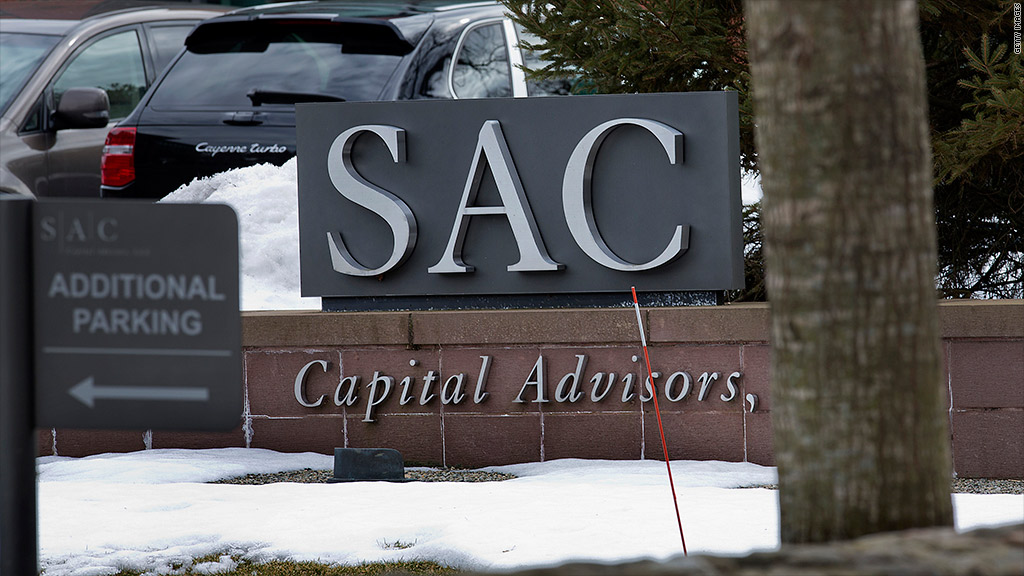
Two units of the hedge fund SAC Capital agreed to pay a total of $614 million to the Securities and Exchange Commission to settle insider trading charges.
But the SEC said that it may still be investigating individuals at the firm, which was founded by billionaire Steven A. Cohen.
The SEC said one unit, CR Intrinsic Investors, agreed to pay roughly $600 million in fines, because the fund made $275 million in "illegal profits or avoided losses" related to trading on inside information in the pharmaceuticals company Elan (ELN).
Another unit of SAC, Sigma Capital, will pay the SEC $14 million for trading "based on nonpublic information" from the financial results of Dell (DELL) and Nvidia (NVDA), according to the SEC's complaint.
Related; SAC Capital's day of reckoning
The $600 million settlement is the largest settlement in the SEC's history for insider trading. The next largest insider trading penalty was the $92.8 million that billionaire hedge fund manager Raj Rajarathnam paid to settle charges for "widespread insider trading" in 2011, according to the SEC.
Junk bond king Michael Milken paid $400 million in 1990 to settle charges that went beyond insider trading and included stock market manipulation, margin violations and defrauding Drexel Burnham Lambert customers.
On a call with reporters, SEC Acting Enforcement Director George Canellos said these settlements end all "pending cases" against SAC.
"This settlement is a substantial step toward resolving all outstanding regulatory matters and allows the firm to move forward with confidence," SAC Capital wrote in a statement.
Still, other cases are pending against individuals at these firms. Both the SEC and the U.S. Attorney for the Southern District of New York have civil and criminal cases pending against CR Intrinsic portfolio manager Mathew Martoma.
An SEC official said that this settlement does not preclude any further actions against other individuals at these funds, including Cohen.
Canellos praised his staff for piecing together this case using a " jeweler's eye for evidence" by digging through trading records, phone records, flight logs and examining trading patterns.
He specifically noted that no wire taps were used to build out the evidence.
According to the SEC's complaint, CR Intrinsic executed the trades using inside information in July 2008 "ahead of what would be a negative announcement involving the clinical trial results for an Alzheimer's drug being jointly developed by Elan and Wyeth."
Dr. Sidney Gilman, a professor of neurology at the University of Michigan Medical School, helped oversee the trial and gave Martoma the results more than a week ahead of the public announcement.
CR Intrinsic and other units of SAC quickly sold roughly $700 million in Elan and Wyeth shares and then took bets against both companies by buying short positions that they eventually sold for $960 million after the trial announcement.
Related: Heinz deal sparks SEC insider trading investigation
Federal regulators have been circling SAC Capital for years.
Since its founding in 1992, SAC has rewarded its investors with annualized returns of more than 25%. In 2012, SAC logged gains of 13%, according to a source familiar with the fund's performance.
Still, many big investors have chosen to redeem money from SAC lately because of the insider trading charges. In mid February, investors redeemed roughly $1.68 billion. As of January 1, 2013, SAC managed $15 billion. Of that, $8 billion is from employees, mostly Cohen's.
Citigroup (C) removed $187 million of client funds out of SAC earlier this year.
Morgan Stanley (MS) still has $180 million tied up with SAC, according to a source. A bank spokesperson declined to comment. Morgan Stanley has a bigger incentive to stay with SAC than most of its other clients. The bank is one of five so-called prime brokers that provide SAC with lucrative support services. The other four prime brokers do not invest with SAC though.


